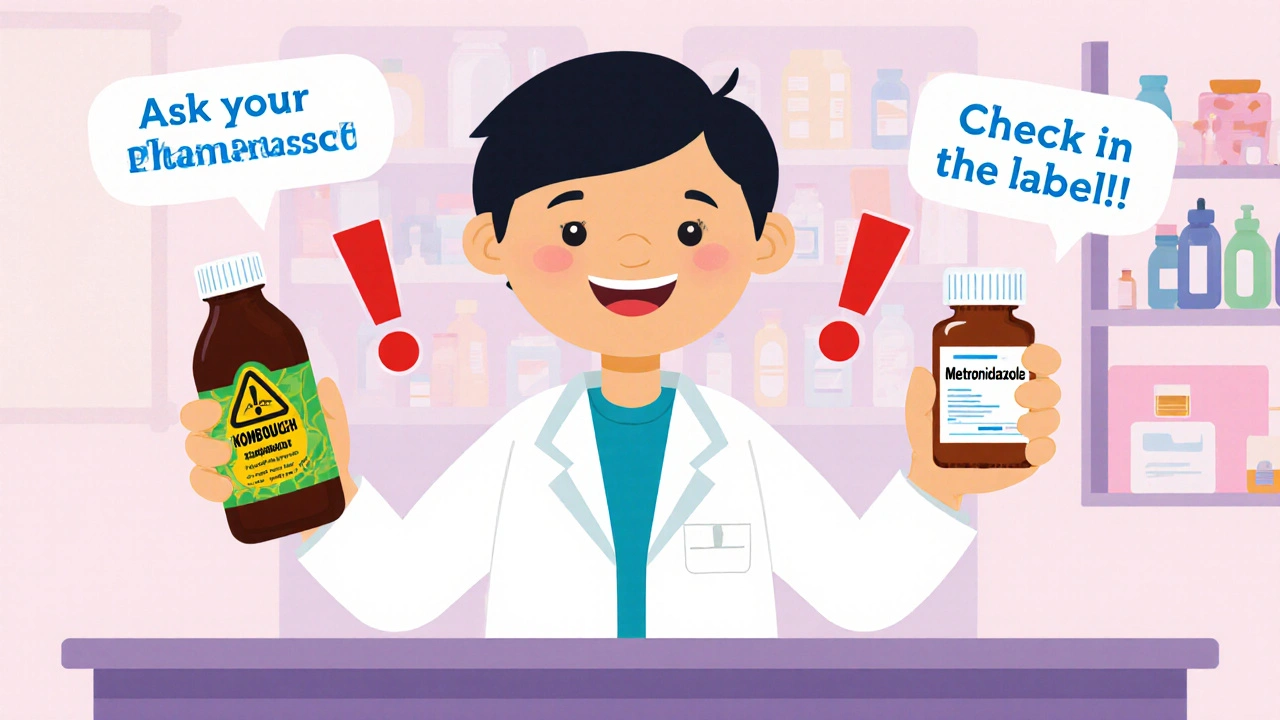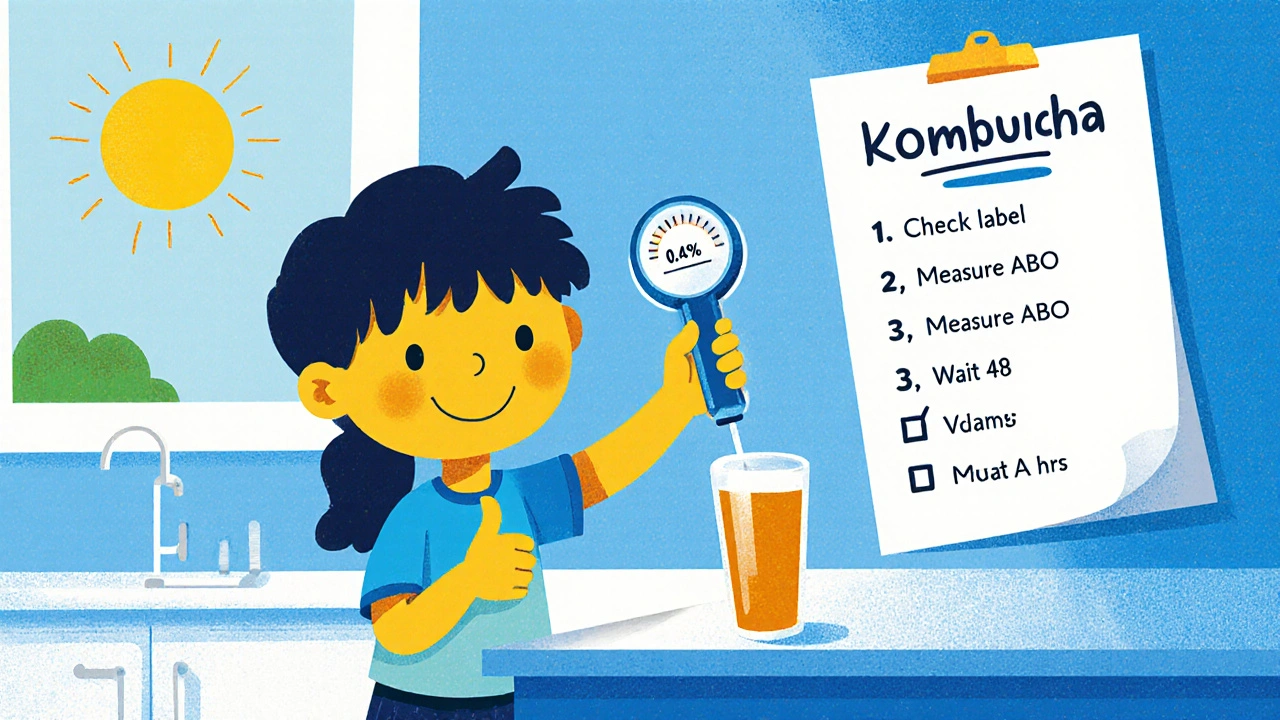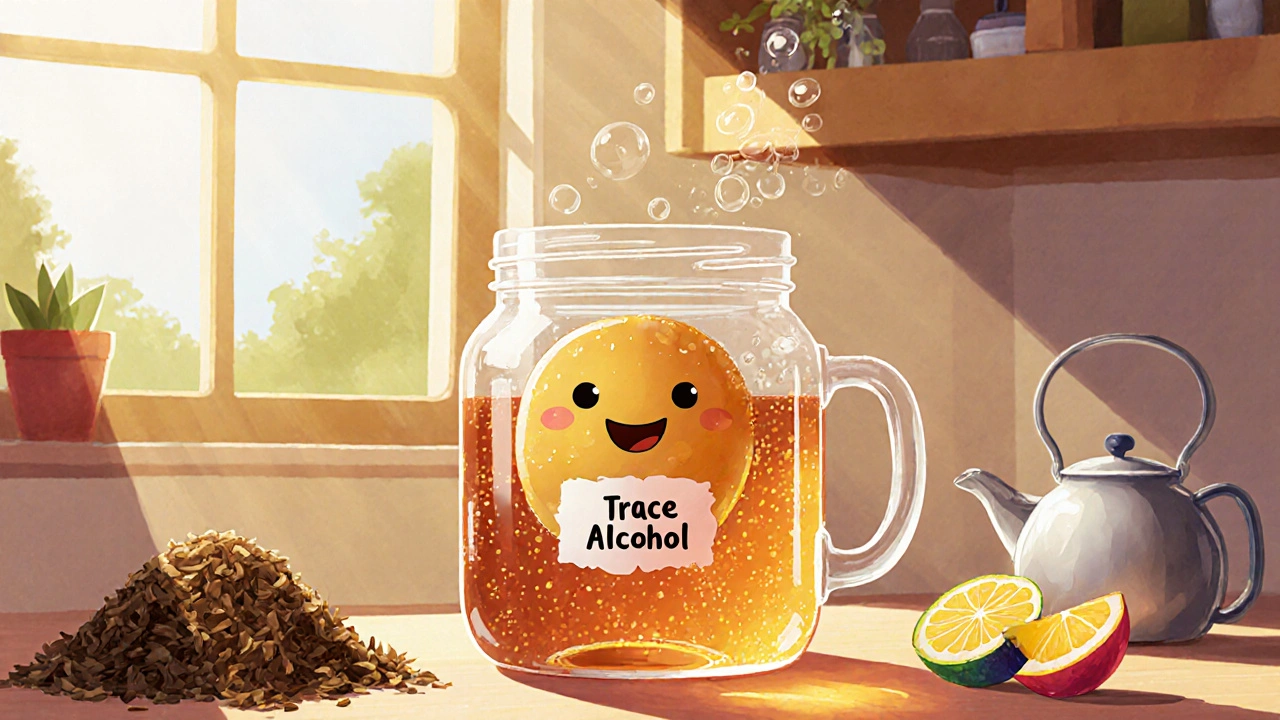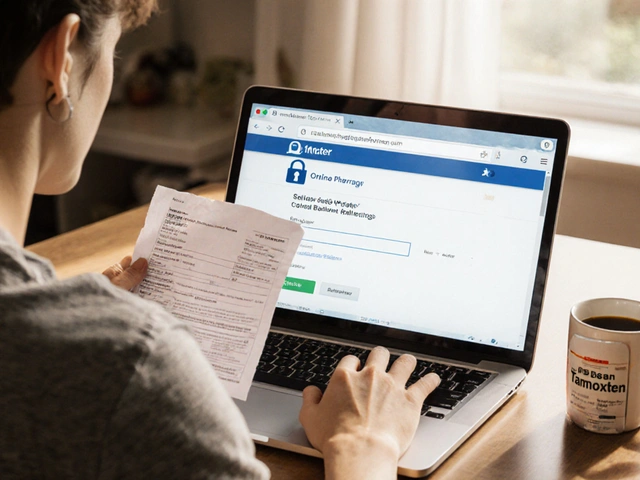Kombucha Alcohol & Medication Safety Checker
When you reach for a bottle of Kombucha thinking it’s just a probiotic boost, you might be ignoring a hidden factor that can mess with the medicines you rely on. Even the tiniest amount of alcohol that forms during fermentation can tip the scales for drugs that don’t play well with ethanol. Below you’ll find the facts you need to keep your gut health goals safe while staying on the right side of your prescription.
Key Takeaways
- Commercial kombucha is limited to ≤0.5% ABV, but home‑brewed batches can hit 2% or more.
- Medications such as metronidazole, benzodiazepines, SSRIs, and many diabetes drugs are flagged as alcohol‑sensitive.
- Even trace alcohol (0.3‑0.5% ABV) can amplify side‑effects or trigger disulfiram‑like reactions.
- Testing your home brew with an alcoholmeter and waiting at least 48 hours after a dose reduces risk.
- Look for “contains trace alcohol” labels and ask pharmacists to confirm if a medication is alcohol‑sensitive.
What is Kombucha, Really?
Kombucha is a fermented tea beverage created by a symbiotic culture of bacteria and yeast (SCOBY) that turns sweetened tea into a fizzy drink packed with probiotics. The fermentation process naturally produces ethanol as a by‑product, which is why kombucha is technically an alcoholic beverage-albeit in very small amounts.
How Much Alcohol Are We Talking About?
Commercial brands in the U.S. must stay under 0.5% ABV to be classified as non‑alcoholic, a rule enforced by the Alcohol and Tobacco Tax and Trade Bureau (TTB) since 2015. That limit is achieved through pasteurization, flash‑heat treatment, or membrane filtration, methods championed by producers like GT’s Kombucha.
Home‑brewed kombucha, however, tells a different story. A 2023 analysis of 150 home‑brew samples (Revolution Fermentation) found ABV levels ranging from 0.5% up to 2.5%, depending on temperature (75‑85 °F), fermentation time (7‑14 days), and oxygen exposure. Some enthusiasts even push the drink into “hard kombucha” territory, deliberately adding extra sugar for a secondary fermentation that can push ABV to 3‑8% (Health‑Ade, Brew Dr.).
Because ethanol content can swing wildly, understanding where your kombucha sits on the spectrum is the first step to safe medication use.
Which Medications Are Sensitive to Alcohol?
The American Pharmacists Association’s 2023 Medication Safety Advisory lists 17 drug classes that can react poorly to even trace alcohol. The most common culprits are:
- Metronidazole - severe nausea and vomiting when ABV >0.5%.
- Benzodiazepines (e.g., diazepam, lorazepam) - enhanced CNS depression.
- Selective serotonin reuptake inhibitors (SSRIs) - increased risk of serotonin syndrome.
- Metformin and other diabetes agents - unexpected drops in blood glucose.
- Cardiovascular nitrates, certain antibiotics (tinidazole), and some antihistamines.
These interactions aren’t just theoretical. A 2023 case report in the Journal of Clinical Pharmacy & Therapeutics described a patient who suffered a disulfiram‑like reaction after drinking a homemade kombucha batch at 1.8% ABV while on metronidazole.

Why Even Small Alcohol Levels Matter
Dr. Andrew Huberman (Stanford) warned that 0.5% ABV can still potentiate CNS depressants by acting on GABA receptors. Meanwhile, the Institute for Safe Medication Practices (2023) notes that ethanol can alter drug metabolism pathways (especially CYP450 enzymes), meaning the body processes the medication faster or slower than intended.
Even if you consider 0.5% ABV equivalent to “overripe fruit,” the cumulative effect of daily sipping adds up. Dr. Deanna Minich calculated that a typical kombucha serving (240 ml) at 0.5% ABV equals about 1.75 standard drinks per week-enough to push some patients over the safe alcohol limit for their prescriptions.
Comparing Alcohol Content Across Common Fermented Drinks
| Drink | Typical ABV | Range in Home/Commercial | Interaction Risk (Alcohol‑Sensitive Meds) |
|---|---|---|---|
| Kombucha (commercial) | ≤0.5% | 0.1‑0.5% | Low‑Moderate |
| Kombucha (home‑brew) | 0.5‑2.5% | 0.5‑2.5% | Moderate‑High |
| Hard Kombucha | 3‑8% | 3‑8% | High |
| Sauerkraut (fermented) | 0.1‑0.5% | 0.1‑0.5% | Low |
| Kefir | 0.2‑0.8% | 0.2‑0.8% | Low‑Moderate |
The table makes it clear: the biggest danger comes from the unpredictable alcohol levels in home‑brewed and hard kombucha.
Testing Your Kombucha at Home
If you brew your own, the only reliable way to know the ABV is to measure it. The HM Digital HA‑520 alcoholmeter (accuracy ±0.1% ABV) is a popular, inexpensive tool. Kombucha Home’s 2022 user study reports that after testing 3‑5 batches you can reliably hit a target ABV.
Steps to test:
- Cool the kombucha to room temperature (alcoholmeter readings are temperature‑dependent).
- Fill a clean cylinder with the liquid, avoiding bubbles.
- Insert the alcoholmeter, read the scale, and record the value.
- If the reading is above 0.5%, consider diluting with non‑fermented tea or waiting for further fermentation to reduce sugar‑driven ethanol production.
Remember: the test only tells you the current ABV. If you plan to store the brew, a secondary fermentation could raise the level again.

Practical Guidance for Medication Users
Here’s a quick protocol that blends expert advice from the Cleveland Clinic (2023) and pharmacy best practices:
- Check the label. Look for “contains trace alcohol” or a specific ABV statement.
- Ask your pharmacist. Provide the exact brand and ABV if known; they can confirm whether your prescription is alcohol‑sensitive.
- Timing matters. Keep at least a 48‑hour gap between taking an alcohol‑sensitive medication and drinking kombucha.
- Home‑brew caution. Test the ABV before each drink. If it’s above 0.5%, treat it like a low‑strength alcoholic beverage.
- Monitor symptoms. Dizziness, nausea, excessive sleepiness, or unexpected blood‑sugar swings after drinking kombucha should prompt a call to your doctor.
These steps help you keep the probiotic benefits without jeopardizing medication safety.
Labeling and Industry Trends
Regulators have been tightening rules. Since January 2024 the FDA requires all kombucha sold in the U.S. to display a “Contains Trace Alcohol” disclaimer. Brands like Health‑Ade now provide batch‑specific ABV data via QR codes, part of a transparency push that started in 2023.
Still, a 2023 survey showed only 63% of commercial products actually list the disclaimer on the front label, leaving many consumers unaware. Pharmacy chains such as CVS and Walgreens have begun adding shelf‑edge warnings, but a 2023 assessment found that only 32% of pharmacists could correctly identify kombucha as an alcohol source.
For home brewers, the market is responding with more affordable testing kits. Sales of alcohol measurement equipment rose 212% in 2023, driven by brands like EasyDens and Anton Paar.
Bottom Line: Stay Informed, Stay Safe
Enjoying kombucha doesn’t have to mean risking a drug interaction, but you need to respect the alcohol it can contain. Commercial bottles are generally safe for most prescriptions if you stay within the recommended serving size and check the label. Homemade batches demand a bit more vigilance-measure the ABV, keep a 48‑hour gap from your meds, and stay alert for any odd symptoms.
When in doubt, reach out to your pharmacist or physician. A quick question about a specific brand or ABV can save you from an unwanted side‑effect.
Frequently Asked Questions
Does commercial kombucha count as alcohol?
Yes, but it is limited to ≤0.5% ABV, which the FDA labels as “trace alcohol.” Most alcohol‑sensitive medications still advise caution at this level.
Can I drink homemade kombucha while on metronidazole?
It’s risky. Even 0.5% ABV can cause severe nausea. Test the brew’s ABV and wait at least 48 hours after a dose, or choose a non‑fermented probiotic alternative.
How accurate is an alcoholmeter for kombucha?
A decent handheld meter (e.g., HM Digital HA‑520) is accurate to ±0.1% ABV when the sample is at room temperature and free of bubbles.
Which drug classes should I watch out for?
Antibiotics like metronidazole and tinidazole, benzodiazepines, SSRIs, diabetes drugs (e.g., metformin, chlorpropamide), nitrates, and several antihistamines are flagged as alcohol‑sensitive.
Is “hard kombucha” safe for anyone on medication?
Hard kombucha (3‑8% ABV) is essentially a light beer. It should be avoided by anyone on alcohol‑sensitive meds unless a doctor explicitly permits it.





14 Comments
Aaron Kuan
Got the gist, but I’ll keep it simple: kombucha’s trace alcohol can mess with meds, especially the ones listed. Stay alert and test your brew.
Nathan Comstock
Listen up, folks. The science isn’t some fringe rumor; the FDA regulations and peer‑reviewed studies prove even 0.3% ethanol can amplify CNS depressants. If you’re on metronidazole or a benzodiazepine, treating kombucha like harmless soda is a gamble you don’t want to take. The nation’s health depends on respecting these facts.
Terell Moore
The pretentious veneer of the modern health‑food market often masks a biochemical reality that is both elementary and unforgiving. Kombucha, once a humble symbiotic culture revered in folk medicine, has been industrialized into a shelf‑stable commodity that nonetheless retains the metabolic by‑product of fermentation: ethanol. Regulatory bodies such as the TTB and FDA have codified the threshold of 0.5% ABV precisely because the pharmacokinetic interplay between ethanol and a myriad of drug classes is well‑documented. When ethanol is introduced, cytochrome P450 enzymes can be inhibited or induced, leading to altered clearance of medications ranging from metronidazole to selective serotonin reuptake inhibitors. The result is not merely a marginal increase in side‑effects but a potential for clinically significant disulfiram‑like reactions that can precipitate severe nausea, vomiting, and even cardiovascular instability. A case study from 2023 illustrated a patient on metronidazole who experienced a disulfiram reaction after consuming a home‑brewed batch measured at 1.8% ABV, underscoring that the risk is not theoretical. Moreover, the pharmacodynamic potentiation of GABAergic agents such as diazepam is amplified even by trace amounts of alcohol, compounding central nervous system depression. This phenomenon is not exclusive to benzodiazepines; SSRIs can experience altered serotonergic tone, raising the specter of serotonin syndrome in susceptible individuals. From a clinical standpoint, the prudent physician will advise a 48‑hour buffer between ingestion of any ethanol‑containing beverage and the administration of alcohol‑sensitive drugs. The practical implication for the consumer is straightforward: verify the ABV of any kombucha, especially home‑brewed variants, with a calibrated alcoholmeter. Commercial brands typically fall below the 0.5% threshold due to pasteurization, yet labeling inconsistencies persist, as recent surveys indicate only 63% of products display the required disclaimer. Hard kombucha, boasting 3‑8% ABV, crosses the boundary into the realm of alcoholic beverages and should be categorically avoided by patients on these medications unless a doctor explicitly permits it. The metabolic burden imposed by ethanol also extends to glucose homeostasis, explaining why diabetic patients on metformin may observe unexpected hypoglycemia after regular kombucha consumption. In sum, the interaction matrix is dense, the evidence is robust, and the clinical guidance is unambiguous. Dismissal of these facts as hyperbole is tantamount to negligence, and the responsible course is to treat kombucha with the same caution one would afford any low‑strength alcoholic drink.
Amber Lintner
Sure, the article sounds alarmist, but I love a good plot twist. Imagine sipping a sparkling tea, only to have your belly start dancing with nausea because of a hidden Booze‑Monster. The drama unfolds when you realize your calm morning routine just turned into a pharmacological thriller. Keep the bottle locked, or the plot will thicken.
Lennox Anoff
Your melodrama is nothing more than fear‑selling.
Bianca Larasati
You’ve got the facts, now let’s turn them into action! First, grab an alcoholmeter and give your brew a quick check before you pop the top. If the reading says anything above 0.5%, treat that batch like a light cocktail and give your meds some breathing room. Second, set a timer for at least 48 hours after you take an alcohol‑sensitive prescription before you pour a glass. Third, keep a simple log – date, brand, measured ABV, and any symptoms you notice – because patterns are easier to spot on paper. Remember, the gut loves consistency, so a steady low‑ABV kombucha can be a probiotic win without the risk. If you’re ever in doubt, call your pharmacist; they love a good challenge and can confirm whether a particular label is safe. Also, don’t forget that many commercial bottles now include QR codes with batch‑specific ABV data – scan it, save it, thank science. For home brewers, consider a secondary fermentation in a sealed container; this can actually reduce ethanol as the yeast shifts toward carbonation. And if you’re on a diabetes regimen, monitor your blood sugar closely after each sip; the sugar‑alcohol combo can surprise you. Stay enthusiastic, stay informed, and keep that probiotic fizz flowing without the side‑effects drama. Your health is the ultimate reward for this effort.
Corrine Johnson
Indeed, the interplay between ethanol and pharmacodynamics, particularly within the cytochrome P450 system, demands rigorous scrutiny, and yet many consumers remain blissfully unaware. When a patient ingests kombucha, even at a modest 0.4% ABV, the ethanol component, albeit trace, can inhibit enzyme activity, leading to elevated plasma concentrations of drugs such as metronidazole, benzodiazepines, and certain SSRIs, which in turn heightens the risk of adverse reactions. Furthermore, the presence of residual sugars, organic acids, and microbial metabolites, all of which are intrinsic to the fermented matrix, may synergistically modulate drug absorption, a factor that is frequently overlooked in clinical counseling. It is therefore incumbent upon healthcare professionals, pharmacists, and prescribers, to query patients about their kombucha consumption habits, and to provide explicit guidance, especially when prescribing alcohol‑sensitive medications. From a regulatory perspective, the FDA’s recent mandate for “Contains Trace Alcohol” labeling, although a step forward, suffers from inconsistent implementation, as evidenced by market surveys revealing that a sizeable proportion of products still omit this critical information. In addition, the burgeoning market of “hard kombucha,” with ABV levels approaching those of craft beers, poses an even greater challenge, necessating a clear demarcation between non‑alcoholic and alcoholic categories, both for manufacturers and consumers. Patients who neglect to observe the recommended 48‑hour interval between medication dosing and kombucha intake may inadvertently experience potentiated central nervous system depression, heightened serotonergic activity, or unpredictable glycemic fluctuations. Consequently, a comprehensive approach-incorporating accurate ABV measurement, diligent label review, timely pharmacist consultation, and vigilant symptom monitoring-constitutes the optimal strategy for safely integrating kombucha into a therapeutic regimen.
Jennifer Stubbs
Testing your kombucha isn’t rocket science, just a quick dip of an alcoholmeter into a chilled sample. Results above 0.5% should trigger the same caution you’d apply to a light beer. Pair that data with the timing of your prescription to avoid overlapping peaks. Keep a small notebook of batch numbers; patterns emerge quickly. This method keeps the probiotic benefits without compromising medication safety.
Abhinav B.
Bro, i tell u, kombucha is like a sneaky party in a bottle, but if u on meds u gotta watch out!!! the alcohol part is real, even if its tiny. i seen peoples get sick from metronidazole + home brew, trust me. use a meter, or just stick to store bought, its safer. stay healthy my friends.
Abby W
Okay, spill the tea ☕️-you’re basically drinking a micro‑brew, so why not embrace it? 🍹 Just remember the 48‑hour rule after your meds, and don’t forget to snap a pic of the label for later 📸. If you’re home‑brewing, those alcoholmeters are a game‑changer, trust me 🙌. Stay bubbly, stay safe! 😊
Lisa Woodcock
Hey there, I totally get the excitement around kombucha’s probiotic boost, but it’s wise to double‑check the alcohol content, especially if you’re on prescriptions like metronidazole or SSRIs. A quick meter reading can give you peace of mind, and a short break between drinking and medication can prevent unwanted side effects. If you ever feel uncertain, a friendly chat with your pharmacist can clear things up. Take care and enjoy your fizz responsibly!
Sarah Keller
In the grand tapestry of human health, the pursuit of balance often collides with the unintended consequences of our own creations. Kombucha, a fermented elixir championed for its microbiome‑enhancing properties, embodies this paradox by delivering both probiotic potential and a whisper of ethanol. When we ingest even a fractional alcohol content, we are, in effect, introducing a psychoactive molecule that can modulate the very pathways our medications rely upon. The hepatic cytochrome P450 system, a biochemical gatekeeper, can be inhibited or induced by ethanol, thereby altering the pharmacokinetics of drugs such as metronidazole, benzodiazepines, and selective serotonin reuptake inhibitors. This interaction is not a marginal footnote; it can manifest as amplified sedation, serotonin syndrome, or disulfiram‑like reactions, outcomes that clinicians strive to avoid. From an ethical standpoint, prescribing physicians have a duty to inform patients of these risks, and patients have a responsibility to heed such counsel. The modern market, in its haste to capitalize on wellness trends, often skirts comprehensive labeling, leaving consumers to navigate a murky informational landscape. Regulatory bodies have attempted remediation through mandatory “Contains Trace Alcohol” statements, yet compliance remains uneven, as evidenced by recent audits showing only two‑thirds of products adhere to the requirement. Home brewers intensify the challenge by producing batches with ABV ranging from 0.5% to beyond 2%, highlighting the necessity of personal testing equipment. A simple handheld alcoholmeter, calibrated to ±0.1% accuracy, can demystify the process, granting the brewer agency over their concoction’s potency. Equally important is the temporal separation between medication dosing and kombucha consumption; a 48‑hour interval provides a safety buffer that accommodates metabolic clearance. Patients managing chronic conditions, particularly diabetes, should monitor glycemic fluctuations after each serving, as the sugar–alcohol nexus can precipitate unexpected drops. The philosophical lesson here is clear: health interventions, however well‑intentioned, must be scrutinized through the lens of systems biology, acknowledging the interdependence of diet, microbiota, and pharmacotherapy. Neglecting this holistic perspective reduces complex human beings to a series of isolated variables, a reductionism that modern medicine must resist. Thus, embracing kombucha responsibly means measuring, timing, and communicating-principles that align with the broader ethos of patient‑centered care. In the end, the choice is yours: savor the fizz with informed caution or forgo it altogether, but never surrender to ignorance.
Veronica Appleton
Here’s a quick cheat‑sheet: check the label for ABV, use a meter if you brew, keep a 48‑hour gap from meds, watch for dizziness or nausea, call your pharmacist if unsure, enjoy the probiotics safely.
Deborah Galloway
Take care and keep sipping responsibly!